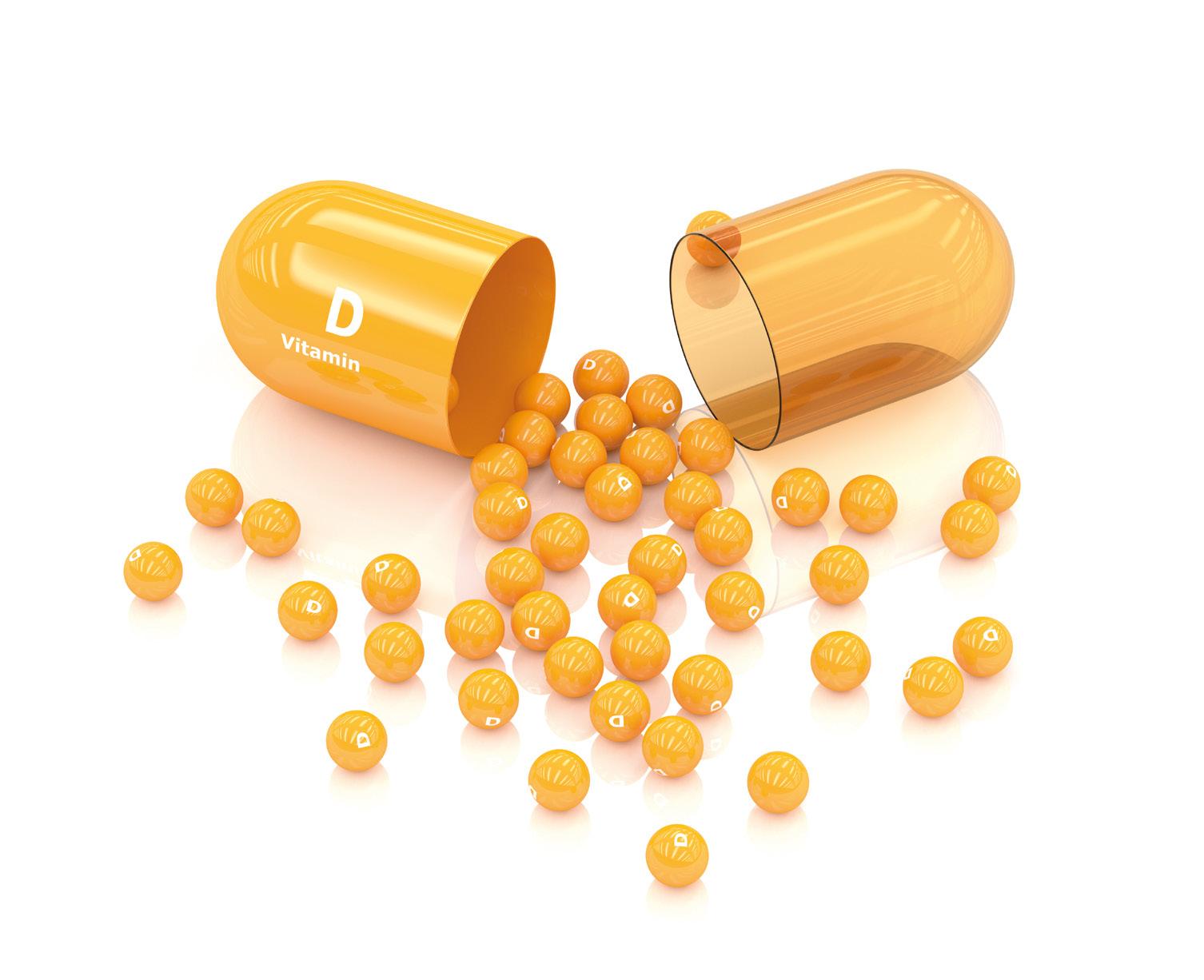
3 minute read
Vitamin D
VITAMIN D. IT’S CALLED THE ‘SUNSHINE VITAMIN’ BECAUSE OUR BODIES CAN PRODUCE IT WHEN EXPOSED TO THE SUN’S UVB RAYS. – IF THAT’S THE CASE, THEN SURELY WE DON’T NEED TO WORRY ABOUT A DEFICIENCY? While that may have been true in the past, vitamin D deficiency is a growing health concern worldwide.
Shedding light on low vitamin D levels
Factors such as broad-spectrum sunscreens that block all UV rays, and lower dietary intakes, means more people produce insufficient amounts of this important vitamin.
Those who shun the sun, omit dairy from their diets due to a milk allergy or lactose intolerance, or adhere to a strict vegan diet may be at the greatest risk for a deficiency, in which case fortified foods and supplements may be necessary.
More than just strong bones
Most of us already know the important role vitamin D plays in bone health – it regulates calcium absorption, so a deficiency is linked to decreased bone strength and density, and can cause rickets.
However, its traditional classification as a bone-building nutrient means many people pay little attention to vitamin D, at least until their later years. Now, a growing body of research reveals numerous other health benefits associated with adequate vitamin D levels.
These include reduced risks of heart disease and diabetes, and it could potentially lower our risk of respiratory diseases and chronic noncommunicable diseases in adulthood.
Studies have also linked insufficient levels of vitamin D in females to higher body fat, depression and adverse pregnancy outcomes. Specifically, low vitamin D levels during pregnancy may increase the risk of ADHD in your child, according to a Finnish study published in The Journal of the American Academy of Child & Adolescent Psychiatry.
A 2018 study by researchers at the University of California San Diego School of Medicine also suggests that higher levels of vitamin D are associated with a decrease in breast cancer risk. Additionally, vitamin D regulates the expression of more than 200 human genes.
These insights and the fact that cells in most tissues contain a vitamin D receptor suggests that this vitamin has diverse roles in maintaining optimal human health and development.
Vitamin D’s performance benefits
But it’s not just our general health where vitamin D
delivers benefits. It also helps to regulate fat metabolism, which can assist with weight loss and body composition. It is also crucial for optimal muscle function and post-workout recovery as it decreases inflammation. You could also gain an endurance boost due to vitamin D’s role in aerobic energy production. A study published in the European Journal of Preventive Cardiology showed that an increase in vitamin D was associated with a higher VO2 max, which is a physiological measure directly linked to endurance performance. Based on its many roles and functions, adequate vitamin D levels are clearly more important than many of us realise.
Boosting your intake
Other than direct sun exposure, which we should limit to short 10-15 minutes periods a few times a day to lower the risk of skin cancer, the best dietary vitamin D sources include egg yolks, beef liver and fatty fish such as tuna, herring, mackerel and salmon. Vitamin D is also found in supplements and various fortified dairy and cereal products in two different forms: D2 (ergocalciferol) and D3 (cholecalciferol), which both increase vitamin D in the blood. As vitamin D requirements are highly individualised, any recommended supplemental approaches should be determined in consultation with a qualified healthcare practitioner.
Tips to boost vitamin D levels:
Expose skin to the sun’s ultraviolet rays for a few minutes each day. Optimal durations vary depending on skin type.
Get this ultraviolet exposure as near to solar noon as possible – generally between 10am and 2pm.
Add more vitamin D-rich foods to your daily diet.
Supplement with vitamin D2 or D3, if additional support is required.


